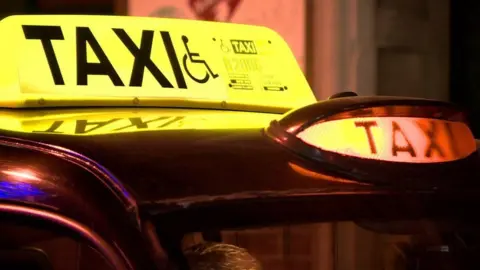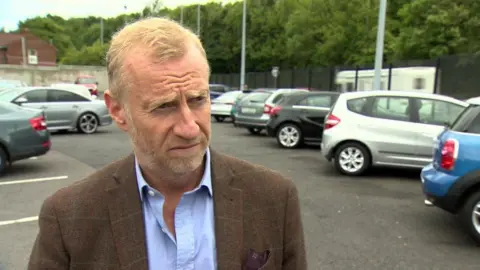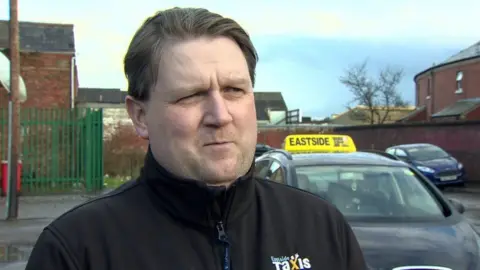Taxi firms in NI 'slaughtered with work' amid driver shortage
 BBC
BBCNorthern Ireland's biggest taxi firm has said it turned down 70% of customers on Saturday as demand far exceeded the number of available cabs.
Fonacab said it and other firms have been "absolutely slaughtered with work" due to a shortage of drivers.
Figures show the number of registered taxi drivers in Northern Ireland fell by 809 in the past year.
Firms have said some drivers found employment in other industries during the coronavirus pandemic.
They have also blamed difficulties faced by drivers wanting to enter the profession, including licencing and insurance costs.
Stormont officials have said they are speaking to taxi companies about the problems they are facing.
'Ageing workforce'
The Belfast Telegraph reported that Fonacab turned off its booking app in certain areas on Saturday due to the level of demand it was receiving.
"On Sunday with the Féile an Phobail on we were absolutely slaughtered with work and I'd say 70% of the work we were offered was turned away," Fonacab boss William McCausland told the BBC's The Nolan Show.
"That's no service to be providing to the public, it's absolutely pathetic.
"We had 1,400 drivers on our books pre-pandemic and at the minute we had 850 working last week."
He said some drivers' licences may have expired because they were not able to complete their mandated training during the pandemic with test centres being closed.
Taxi drivers are on average older than other employment sectors and many have chosen to retire early, he added.
"It was always a problem in our industry of an ageing workforce and a lot of our drivers would have been in their 60s and some guys were past the age of retirement.
"With Covid you very much were a vulnerable person if you were in that age category as a lot of guys stopped working and have decided to continue retirement."
'Industry in crisis'
Mr McCausland has appealed to Infrastructure Minister Nichola Mallon to review their regulated fares and to ease the requirements to gain a taxi driver's licence in order to "get people into the industry quickly".
"I've been building this business since 1980 when we had 30 drivers and I built it up to 1,400 drivers," he said.

"There's a lot of work and effort went into it and [now I] see it crumbling here because we can't get guys into the industry.
"What's it going to be like when students and tourists start coming back? It's going to be absolutely impossible."
Karl Bennett, who owns Eastside Taxis in Belfast, said the industry was facing a "crisis... in terms of getting drivers to come on board".
He said those who wanted to become taxi drivers faced barriers including "theory tests and the expense of trying to get a taxi licence".
"It can take three to six months before you qualify," he said.
"We work with nursing homes, people going to hospital appointments, disability charities, we take vulnerable children to school - all sorts of people are affected by this.
"The testing is the problem - we want to work with the department to come up with a solution to help the industry as a whole."

Democratic Unionist Party (DUP) MLA Jonathan Buckley said "bureaucracy in the system" was preventing new drivers entering the industry.
"These [concerns] simply cannot be batted away," he said.
'Training is necessary'
The Department of Infrastructure said any "relaxation or simplification" of licencing for taxi drivers would require "legislative consideration".
"As taxi drivers are providing a service to the public it is necessary to ensure that such drivers undergo the necessary training to continually develop their knowledge and skills for road safety purposes throughout their career," it said.
"The taxi theory and practical tests are a requirement of the Taxi Licensing Regulations (Northern Ireland) 2015."
The department acknowledged there had been "limited opportunity for first-time applicants" to do those tests during much of the pandemic but they had resumed in April.
The sector had been given £16.7m in both financial and regulatory support to help it during the pandemic, added the department.
It said its officials had discussed the problems with taxi industry representatives and would continue to do so.
